If you rely on Jenkins and use the Pipeline Maven Integration Plugin, you may be exposing sensitive usernames in your build logs, even if you take steps to mask them as secrets. This problem, officially tracked as CVE-2023-41934, applies to plugin versions 133.v18e473854496 and earlier.
This post is your exclusive, in-depth guide to what causes the vulnerability, how you can demonstrate it, and how to protect your credentials.
What Is CVE-2023-41934?
When you use the Maven Integration Plugin for Jenkins pipelines, you often specify credentials (usually a username and secret/password) in your Maven settings. There's an option to "Treat username as secret". This is meant to mask both the password and the username in Jenkins logs.
But due to a flaw, usernames were not properly masked, appearing in plain text in your job logs. This means attackers or anyone with log access could grab these usernames, which is often half the battle for successful credential theft.
Who’s Affected?
- All Jenkins users with the Pipeline Maven Integration Plugin, up to and including 133.v18e473854496
- Anyone configuring Maven builds in Pipelines, especially with custom Maven settings and credential bindings
Usernames can be as sensitive as passwords
- Usernames can often be guessed, but sometimes they are also secrets (API keys, email addresses, internal IDs, etc.)
Sample Jenkinsfile:
pipeline {
agent any
stages {
stage('Build with Maven') {
steps {
withCredentials([usernamePassword(credentialsId: 'maven-credentials',
usernameVariable: 'MAVEN_USERNAME',
passwordVariable: 'MAVEN_PASSWORD')]) {
sh '''
echo "Preparing Maven settings.xml"
cat > settings.xml <<EOF
<settings>
<servers>
<server>
<id>private-repo</id>
<username>${MAVEN_USERNAME}</username>
<password>${MAVEN_PASSWORD}</password>
</server>
</servers>
</settings>
EOF
# Run Maven with custom settings
mvn deploy --settings settings.xml
'''
}
}
}
}
}
Suppose your MAVEN_USERNAME is super_secret_user.
Expected behavior: When Jenkins masks secrets, the username super_secret_user should be replaced with <b></b> or similar in the logs.
Actual vulnerable behavior: The username is written out in the log, visible to anyone with access:
Preparing Maven settings.xml
<settings>
<servers>
<server>
<id>private-repo</id>
<username>super_secret_user</username>
<password></password>
</server>
</servers>
</settings>
Notice: password is masked, but username is exposed.
Why Did This Happen?
The plugin logic did not properly check and mask the username field when "Treat username as secret" was checked. Jenkins core properly masks known secret values, but the plugin must tell Jenkins which values to treat as secrets, and failed to include usernames here.
Enumerate usernames for Maven artifact repositories
- Know which accounts are used for deployment/publishing
Exploit Example
To exploit this, download or view the build logs after a pipeline runs. Look for the <username> tag in any settings.xml, or search for terms like username or MAVEN_USERNAME. If masking does not apply, usernames are exposed.
Fix Details
- Patched in version: Jenkins Pipeline Maven Integration Plugin 1334.v1c1fa_4be6b_c7
- The patch makes sure Jenkins replaces usernames with “”, matching password masking, whenever “Treat username as secret” is checked.
Official Jenkins Security Advisory:
SECURITY-3204 / CVE-2023-41934
- CVE Record - CVE-2023-41934
- Pipeline Maven Integration Plugin page
Conclusion
CVE-2023-41934 is a reminder: never assume masking “just works”. Always check your logs, update vulnerable plugins, and treat all parts of credentials as potentially sensitive. If you use Jenkins for Maven builds, upgrade and audit your pipelines today!
*Stay secure and share this post if you found it useful!*
Timeline
Published on: 09/06/2023 13:15:10 UTC
Last modified on: 09/12/2023 13:24:46 UTC
